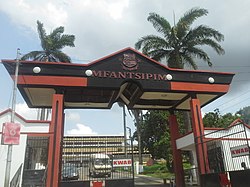Top Qs
Timeline
Chat
Perspective
Mfantsipim School
All-boys boarding secondary school in Cape Coast, Ghana From Wikipedia, the free encyclopedia
Remove ads
Mfantsipim School is an all-boys boarding secondary school in Cape Coast, Ghana,[1][2] established by the Methodist Church in 1876 to foster intellectual, moral, and spiritual growth on the then Gold Coast. Its founding name was Wesleyan High School and the first headmaster was James Picot, a French scholar, who was only 18 years old on his appointment.
This article needs additional citations for verification. (January 2018) |
Mfantsipim is nicknamed The School because it gave birth to other prominent schools such as Prempeh College.[3]
Remove ads
History
Summarize
Perspective
The idea of establishing a collegiate school to raise educational standards in the Gold Coast was first mooted in 1865 but was not realized until 1876 when the Wesleyan High School was established in Cape Coast with donations from local businessmen and the support of the Methodist Missionary Society in London. The school was originally intended to be situated in Accra, owing to a decision by the British Government to move the capital of the Gold Coast from Cape Coast to Accra by 1870. However, due to local agitation and the urgency to implement the idea, it was finally established in Cape Coast, although there were initial plans to later move it to Accra, a relocation that never happened.
On 3 April 1876, the school was established as Wesleyan High School.
Foundation and early development
Mfantsipim School was established in 1876 as Wesleyan High School in Cape Coast, primarily to train teachers with an initial enrollment of 17 pupils. The idea of establishing a collegiate school in the Gold Coast dates back to 1865, but it took eleven years to realize this vision. The school's location was chosen amidst local agitation and the urgent need to start the institution, despite initial plans to establish it in Accra.[4][5]
The first headmaster was James Picot, a young French scholar, who was only 18 years old at his appointment. Despite his youth and relatively limited experience, Picot played a crucial role in the school's early days.[6]
Name change and evolution
In 1905 a graduate of the school, John Mensah Sarbah, founded a rival school named Mfantsipim; the name derives from "Mfantsefo-apem",[7] literally meaning "thousands of Fantes" but actually meaning "the gathering of hosts of scholars for change" originally by the Fantes. In July of the same year, the two schools were merged under the supervision of the Methodist Church, keeping the name Mfantsipim.[8]
On 9 March 2000, the former headmaster of Mfantsipim, O. K. Monney, passed away after having suffered from cancer for some time.[9]
Academic and cultural traditions
The school celebrates annual events such as the Speech and Prize Giving Day, which dates back to 1908, initiated by Rev. W. T. Balmer. The school anthem, Botae Pa, sung at various events, encapsulates the school's history, values, and aspirations.[10][11]
Historical relocation and expansion
Originally built on the premises of the Cape Coast Castle, Mfantsipim was later moved to its current location on Kwabotwe Hill in northern Cape Coast in 1930. This move marked a significant phase in the school's expansion and development.[10]
Notable alumni
- Ernest Addison, current governor of the Bank of Ghana
- Paa Kwesi Amissah-Arthur, former vice president of the Republic of Ghana
- Kofi Annan, Nobel Peace Prize laureate and former Secretary-General of the United Nations[12]
- Kow Nkensen Arkaah, former vice president of the Republic of Ghana[13]
- Raphael Armattoe, scientist, nationalist, writer[14]
- Albert Adu Boahen, academic, historian and politician[15]
- Kofi Abrefa Busia, political leader, academic and Prime Minister of Ghana (1969–1972)[16]
- Mohamed Ibn Chambas, former president of ECOWAS commission
- Joseph W.S. de Graft-Johnson, former vice president of the Republic of Ghana[17]
- Joe de Graft, writer, playwright and dramatist; first director of the Ghana Drama Studio[18]
- J. E. Casely Hayford, journalist and politician[19]
- Kobina Arku Korsah, first chief justice of Ghana[20]
- John Mensah Sarbah, diplomat, prominent lawyer and political leader in the Gold Coast (now Ghana)[21]
- Nana Kobina Nketsia V, Paramount Chief (Omanhen) of the Essikado (British Sekondi) Traditional Area in the Western Region of Ghana[22]
- Alex Quaison-Sackey, diplomat, first black president of the UN General Assembly
- Kobina Sekyi, lawyer, writer, nationalist[23]
- Tsatsu Tsikata, academic and lawyer[24]
- Arthur Wharton, England’s first black professional footballer[25]
Remove ads
Awards
References
Wikiwand - on
Seamless Wikipedia browsing. On steroids.
Remove ads


